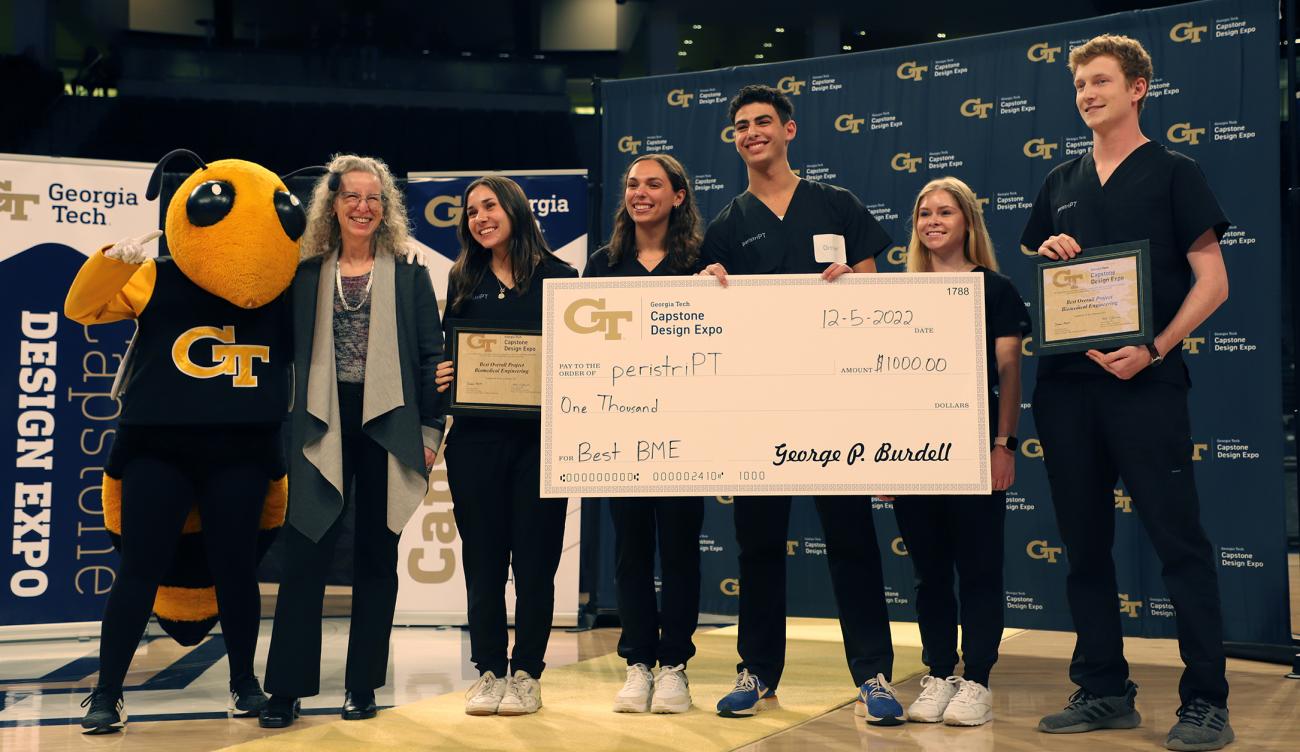By Jerry Grillo
When a gastrointestinal cancer spreads, it can cause peritoneal carcinomatosis, a rare form of cancer that causes tumors to proliferate on the peritoneum, a thin layer of tissue that lines the abdomen, covering most of the organs there.
The current gold standard treatment is a combinational approach called cytoreductive surgery and hyperthermic intraperitoneal chemotherapy (or HIPEC): First, all visible tumors are surgically removed, then the peritoneum is stripped away and the cavity is doused with heated chemotherapy, which kills any remaining cancer cells.
It has proven to be effective, but it is also dangerous, and the entire procedure can take 10 hours. Removing the cancerous peritoneum is a delicate and tedious process that can easily last two hours.
“It’s a super invasive surgery, which means the patient spends a lot of time under anesthesia. So, our goal is to create a device to help strip the peritoneum away a lot quicker and easier,” said Alex Hall, a member of peristriPT, a team of five seniors who presented their device at the Fall 2022 Capstone Design Expo on Monday, Dec. 5, at the Fall 2022 Capstone Expo. Hall and his teammates won the Best Project award in the Wallace H. Coulter Department of Biomedical Engineering, along with a $1,000 prize.
Hall and his teammates – Allisson Rosenthal, Catherine DeVarenne, Omar Kayyali, and Rachel Grosswald – were among 17 groups of biomedical engineering students at the expo, which featured 110 teams from across campus. The overall winner for the expo was a team from the School of Electrical and Computer Engineering that designed a talking trashcan to help reduce food waste in university dining halls.
Meanwhile, the teams from Coulter BME tackled a broad range of healthcare challenges with a creative suite of solutions.
A team called Spoiler Alert developed an insulin antibody test, very much like the tests millions of people have used in recent years to test for the Covid virus. The idea is to help people with diabetes determine if their medicine is still effective. Like the Covid tests available in your local drugstore, these are easy to use, featuring a test line and control line that can change color depending on the results.
“Insulin has to be kept in a very specific temperature range – outside of that range, it can go bad, but there’s currently no way to tell whether or not your insulin has gone bad,” said Mark Nissen, who has intimate understanding of this problem – his mother has type 1 diabetes, and he has four of the five antibodies that are an indication of the disease. “We realized we needed a rapid test. Our device tests for amyloid fibrils, an indication that the insulin has gone bad.”
Five women calling themselves Wristy Business developed the WRISTraint, an orthopedic implant designed to treat a common injury. The failure rate of this kind of ligament repair in the wrist is 40 to 70 percent.
“So, our device helps maintain the integrity of ligament repairs and reconstructions,” explained Gwyn O’Sullivan, whose team developed a small titanium implant. “These bones move in three dimensions and can pull apart. Our device holds the wrist bones in place, so it can heal properly”
For several the peristriPT team, the challenge was to help simplify a complex and arduous surgical procedure. Removing the peritoneum lining from the abdominal wall during cytoreductive surgery involves using an electro surgical knife to enter the plane between the two layers. Then the surgeon basically uses blunt force to peel away the cancerous peritoneum, a small piece at a time, almost like removing wallpaper.
“And it can be difficult to remove every tumor,” said Hall, whose team was sponsored by the Mayo Clinic. “We wanted to optimize this process.”
They developed a tool called the eagle PRO. A surgical knife is used to make small incision in the peritoneum, through which the eagle PRO device is inserted – it’s like a balloon on a stainless-steel guidewire, with a rounded, ball tip at the end. Using the guidewire, the thin balloon can be inflated, separating the peritoneum from the abdomen wall. Then the surgeon can cut away the cancerous lining.
The team tested their prototypes on cadavers and reported dramatic results: The eagle PRO was 10 times faster than the current cut-and-pull procedure, and is safer, preventing damage to organs in all regions of the abdominal cavity. It’s also cost-effective. The $100 device saves about $7,000 per surgery.
Latest BME News
Jo honored for his impact on science and mentorship
The department rises to the top in biomedical engineering programs for undergraduate education.
Commercialization program in Coulter BME announces project teams who will receive support to get their research to market.
Courses in the Wallace H. Coulter Department of Biomedical Engineering are being reformatted to incorporate AI and machine learning so students are prepared for a data-driven biotech sector.
Influenced by her mother's journey in engineering, Sriya Surapaneni hopes to inspire other young women in the field.
Coulter BME Professor Earns Tenure, Eyes Future of Innovation in Health and Medicine
The grant will fund the development of cutting-edge technology that could detect colorectal cancer through a simple breath test
The surgical support device landed Coulter BME its 4th consecutive win for the College of Engineering competition.









